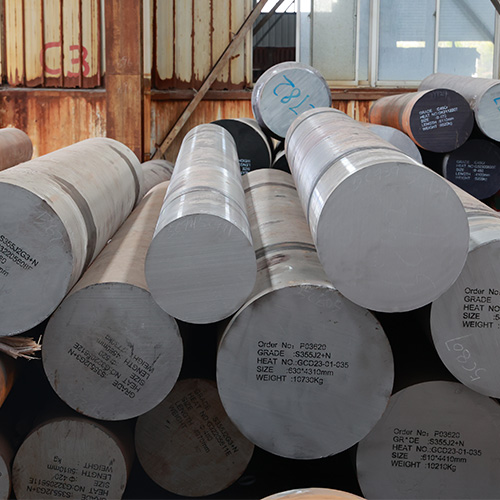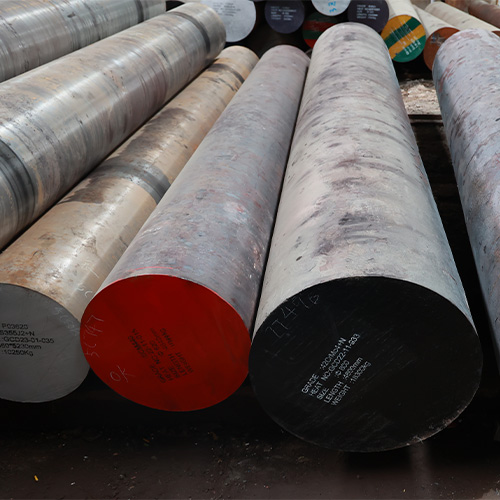Introduction

Steel round bars are fundamental components in various industries, from construction and manufacturing to automotive and engineering. These cylindrical steel rods are renowned for their exceptional strength, durability, and versatility. Their circular cross-section provides optimal resistance to bending and torsional forces, making them ideal for applications demanding high load-bearing capacity and structural integrity.
Steel round bars are the backbone of countless industries. Their unique combination of strength, durability, and versatility makes them indispensable in a wide range of applications. Whether it’s reinforcing concrete structures, fabricating machine parts, or constructing automotive components, steel bars consistently deliver reliable performance.
The Manufacturing Process of Steel Round Bars
From Molten Metal to Finished Product
The production of steel round bars is a complex process involving several stages. It begins with the production of molten steel in a furnace, where iron ore, scrap metal, and other additives are melted together. The molten steel is then continuously cast into a solid billet.
Shaping the Steel
The billet is subsequently heated and rolled into a round shape through a series of hot rolling processes. This reduces the diameter of the billet and increases its length. To achieve precise dimensions and an improved surface finish, the hot-rolled bar undergoes cold drawing, a process that involves pulling the bar through a die.
Enhancing Properties
To further enhance the mechanical properties of the steel, heat treatment processes such as annealing or quenching may be applied. These processes involve heating and cooling the steel to specific temperatures to modify its microstructure and properties.
Quality Assurance
Before reaching the market, the final products undergo rigorous quality control inspections to ensure they meet specified standards. This meticulous inspection process guarantees that the steel round bars are of the highest quality and reliability.
Understanding the Mechanical Properties of Steel Round Bars
The mechanical properties of steel bars, such as tensile strength, yield strength, and hardness, are critical factors that determine their suitability for specific applications. These properties are influenced by various factors, including:
- Steel Grade: Different steel grades possess distinct compositions and mechanical properties.
- Heat Treatment: Heat treatment processes can significantly modify the properties of steel.
- Cold Working: Cold working techniques, such as cold drawing, increase the strength and hardness of the steel.
By carefully selecting the steel grade and applying appropriate heat treatment and cold working techniques, manufacturers can tailor the mechanical properties of steel bars to meet the specific requirements of different applications.
Applications of Steel Round Bars
Steel round bars find extensive applications across diverse industries:
- Construction: Reinforcing concrete structures, fabricating rebar, and providing structural support.
- Manufacturing: Producing shafts, axles, pins, and other mechanical components.
- Automotive: Manufacturing chassis, suspension components, and engine parts.
- Engineering: Fabricating machinery and equipment.
- Agriculture: Constructing farm implements and equipment.
The versatility of steel round bars allows them to be used in a wide array of applications, from the construction of towering skyscrapers to the production of intricate machinery components. Their ability to withstand heavy loads, resist corrosion, and endure harsh conditions makes them the preferred choice for engineers and manufacturers worldwide.
Factors Affecting the Strength and Durability of Steel Round Bars

Several factors influence the strength and durability of steel round bars:
- Material Composition: The chemical composition of the steel, including the presence of alloying elements, significantly impacts its strength and durability.
- Manufacturing Process: The manufacturing process, including heat treatment and cold working, affects the microstructure and properties of the steel.
- Surface Finish: The surface finish of the steel round bar influences its resistance to corrosion and wear.
- Environmental Factors: Exposure to corrosive environments, temperature fluctuations, and mechanical stress can affect the long-term performance of steel bars.
By carefully considering these factors, engineers and designers can select the appropriate steel grade and manufacturing process to ensure optimal performance and durability of steel round bars in various applications.
Conclusion
Steel round bars are versatile and durable materials that play a critical role in numerous industries. Their exceptional strength, durability, and versatility make them an ideal choice for a wide range of applications. By understanding the factors that affect their properties and selecting the appropriate steel grade, engineers and designers can ensure optimal performance in their projects.
As technology continues to advance, new developments in steel production and processing techniques are expected to further enhance the properties and performance of steel round bars. These advancements will open up new possibilities for the application of steel round bars in various industries, making them even more indispensable in the future.
FAQ
Q: What are steel round bars?
A: Steel round bars are cylindrical steel rods used in various industries due to their strength and durability.
Q: What are the key applications of steel bars?
A: Steel bars are used in construction, manufacturing, automotive, engineering, and agriculture.
Q: What factors affect the strength and durability of steel bars?
A: Factors such as material composition, manufacturing process, surface finish, and environmental conditions influence their strength and durability.
Q: How are steel round bars manufactured?
A: Steel round bars are manufactured through processes like steelmaking, continuous casting, hot rolling, cold drawing, and heat treatment.
Q: What are the common steel grades used for round bars?
A: Common steel grades include A36, 1018, 4140, and 4340, each with specific properties suitable for different applications.
